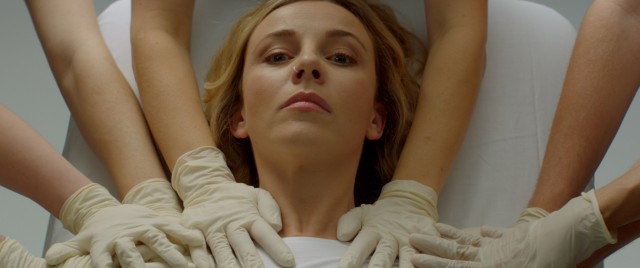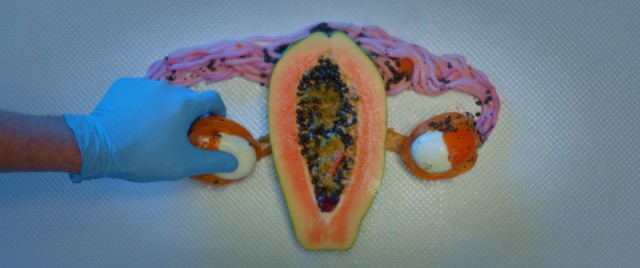You don’t need me to womansplain the woes of the female body. All of you out there are aware that babies come out of vaginas. Vaginas that bleed every month for 30 odd years (if you’re lucky, because when they do stop, it’s a whole other load of sh*t to deal with), which can often feel like a ball of rusty old nails has nested in your nethers. And that’s if everything is normal… Endometriosis is one of countless conditions that affect a large number of women, but is rarely discussed in real life, and even less so on film. It takes a special someone to bring it to the fore in all its gory glory and that special someone is no other than S/W’s favourite taboo-buster Alice Seabright (Sex Ed, Pregnant Pause).
End-O, directed by Seabright and written by Elaine Gracie, who based the script on her own experience of living with Endometriosis, is a sharply observed tragicomedy that centres on two women, navigating their lives and dreams around the condition. Refreshingly honest and effortlessly delivered by lead actress Sophia Di Martino, this 15-minute short is a bleakly funny tale with a soulful core, making it a vital watch for an audience that spans the entire gender spectrum.

Sophia Di Martino as Jaq – End-O’s central character.
The story follows Jaq (Di Martino), freshly post-coital and sporting a hot water bottle strapped around her waist, and her sister Claire, who at 35 is about to have a hysterectomy, in a last-ditch attempt to get her life back. Sitting in the hospital waiting room before the surgery, the sisters dissect Jaq’s date from the night before, which had a perfect start but a bit of a messy ending. Literally.
“It’s fundamentally a film about loss and acceptance”
“When I first received the script for End-O, it was a hilarious, angry and moving cry from the heart and I immediately knew that I wanted to direct it” – Seabright shared with S/W – “It’s a film about this condition, which is woefully under-researched and under-discussed, but it’s fundamentally a film about loss and acceptance. Two sisters struggling with a debilitating condition, coming to terms with the devastating consequences it has on their lives, whilst learning to let go of the sense of shame and weakness that they feel.”

This recurring shot of a uterus, made of food, is one of the visual highlights of Seabright’s short
Technically, the film takes advantage of some tried and tested comedic tools, and it doesn’t exert itself by pushing any cinematic boundaries (although there’s a recurring shot of a uterus, made of fruit and soft-boiled eggs that’s grotesquely brilliant). Instead, the effort in End-O has gone into the mining of a taboo thematic ground and shining a light on the fear and shame of a strong, independent woman. In doing so, Seabright and Gracie send out a powerful message to the world – we are in pain and we need to talk about it. And that message is delivered loud and clear by Di Martino who seems right at home under that spotlight.
Jaq’s character proves to be multi-faceted, shifting from cynical joker to hopeless romantic to raging screamer, and Di Martino’s performance pulls it off with ease. Equipped with some sharp one-liners, her humour is infectious but her raw pain is palpable and familiar. By the end of End-O some of that pain rubs off on you, whether you asked for it or not, because that’s exactly what being a woman involves. Deal with it.

 Serafima Serafimova
Serafima Serafimova